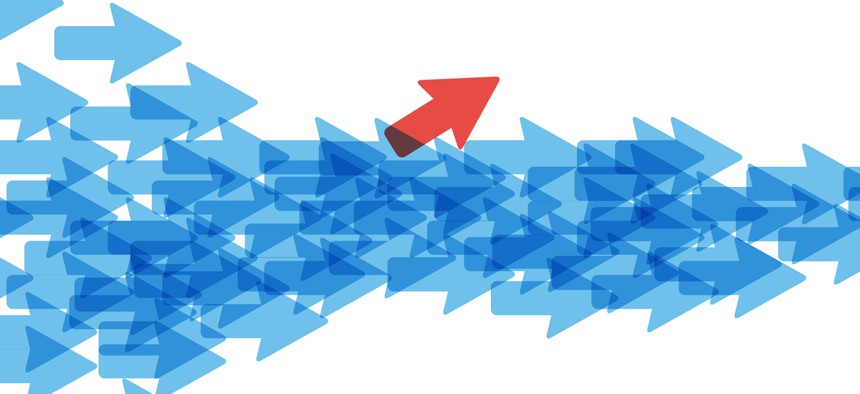Disruption is Necessary to Change Government

Petr Vaclavek/Shutterstock.com
What often feels disruptive brings a new normal.
Historically the term disruption was used to describe turmoil or disorder in a system, culture, or group. Today the term is used to identify significant or radical events that cause us to change how we think or behave. We often see and celebrate significant disruptions, such as technology changing the way we bank, obtain mortgages, travel, buy things, and communicate.
We often think that disruption is technology driven, which in most cases it is. How many trips do you make to your bank compared to 10 years ago? Do you see relatives less now that you text with them almost daily?
Change, if done right, is disruptive for a while, but then brings a new normal. For the government and corporate world to be competitive, cost and process efficient, and more effective, they need to be willing to adopt the new normal and engage new technologies.
Within government, there is much evidence of inefficiencies, lagging technologies, and slowness to change. It sounds ripe for disruption, but it will require clear and deliberate action to cause change and make it stick.
There are five necessary disruptive forces for government to take. They include, but go beyond technology, requiring a significant shift in management and leadership practices. I believe these major disruptive forces will lead to an effective, lower cost, and a more respected government.
Technology Disruption
New technologies in their infancy—artificial intelligence, blockchain and quantum computing—will be the next disruptors. These technologies will support more effective services to Americans and cause internal operations to cost less, be faster, and more accurate. They could enable more secure systems, stronger, more transparent decision-making, self-service operations, and more.
Imagine more accurate processing of payments to dramatically reducing improper payments. Imagine two-thirds of the hiring and selection process being done through AI resulting in faster, more accurate staffing actions. Imagine a technology that will generate accurate warfighting plans down to the number of grenades, MREs, and drones and where to deploy and when. The list can go on, and it will be initially chaotic to budgets and workforce but government could be able to more accurately manage finances, provide health care, administer HR programs, grants and more.
Political Disruption
We see politics as a negative disrupter, and in today’s environment it is. Important legislation is not being addressed, fiscal reform is not being considered, it appears stonewalling, gaslighting, and hypocrisy are prerequisite skills for elected office. But imagine what 537 members and elected officials could do if they followed a regular process, took on the critical imperatives facing our country, and really cared about an efficient and effective government that is financially sound. Eliminating the current collusion of ineptness will be a major disruptor for the good.
Reform Disruptions
Imagine what evidence-based program reform would do for government. Imagine a bipartisan and bicameral national summit leading to a national strategic plan that is consistently implemented. Imagine using technology for two-way communications with the American people. Imagine agencies being willing to address all programs and make necessary reforms. A true reform disruption that sticks across government would result in an efficient, effective and more accountable government.
Workforce Disruption
There are a plethora of dedicated public servants who believe strongly in what they do and are very good at it. There also is a significant minority of employees who are underperforming due to lack of skills or are functioning in a culture of mediocrity. Imagine the disruptive event of aligning the size and scope of the workforce around meaningful programs, investing in developing a strong workforce, redeploying people to mission-critical functions, eliminating unneeded skills or poor performers, providing occupationally-based compensation, really managing performance, and implementing common shared services for efficiency, quality, and lower cost. This disruption would increase productivity and accuracy, dramatically increase engagement, and improve customer service. It would cause a workforce to champion efficiency and effectiveness and true accountability to the American people, and dramatically improve government’s reputation.
Budgetary Disruptions
Imagine if we passed budgets on time, addressed fiscal reform, functioned consistent with a national strategic plan and stayed true with critical imperatives. Imagine if government managers have more flexibility to move budgets around with less “color” designations to achieve results. Imagine if agencies were not penalized for returning or could carry over unused funds. Imagine if true accountabilities existed with outcome-based measures. Disrupting budget management can go a long way to more efficient and faster implementation of programs and the revitalization or elimination of programs when their useful life is up.
Some of the areas listed above may seem elementary or not too advanced but imagine if they truly took place. The transformation to a well-managed government is disruptive but is also possible.
Steve Goodrich is the chief executive officer of the Center for Organizational Excellence, Inc.






